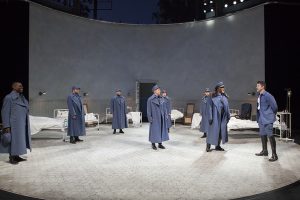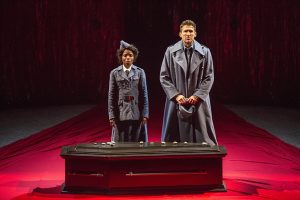Macbeth in the Field Hospital
Macbeth, Macbeth, Macbeth!
Man, that feels good. When you’re actually working on a production of Shakespeare’s Scottish tragedy, it’s OK to speak the name. And to wallow in all those great lines, otherwise forbidden to theatre folk by that infamous curse.
Who knows what new age of better luck would dawn if everybody everywhere stopped saying “Double, double, toil and trouble… or “Screw your courage to the sticking place…” or “Out, dammed spot!” or “…a tale told by an idiot, full of sound and fury, signifying nothing” … or “Lay on, Macduff!..” or so many other ringing chains of words tabooed by the curse?
But that’s crazy speculation. If the curse works, it does so on those who know of it. (I’m not particularly superstitious but I do respect …traditions, especially in an ancient art of illusion like the theatre.) The words of Macbeth are not to be used casually but, as I was taught anyway, they’re probably OK while dealing with an actual staging.

Jonathan Cake in the title role of the Old Globe’s Macbeth gets the work from King Duncan (Jerome Preston Bates).. Jim Cox Photo
And that’s what’s happening at the Old Globe Theatre, for the latest of so many occasions in the company’s glorious 80-year history.
Director Brian Kulick wants to get right down to business and start the fluids flowing but he’s also of the opinion that the grand old play should be boosted right into the present, where Shakespeare often works best. So we’re looking at Scotland as some kind of frozen banana republic where lines of succession are flexible and violence is never far away.
We’re in a military hospital ward, cold and sterile with beds in a wide semi-circle, where King Duncan bursts in to pin a medal on a horribly bandaged survivor of the latest battle. The wretch is so far gone that a nurse, bending to listen carefully, must translate his report of brave Macbeth. When another message from the even more recent battle is delivered, including scorn for the traitorous Thane of Cawdor, the king impetuously sentences Cawdor’s execution and bestows the title on Macbeth. Exuent everybody ambulatory and enter Macbeth and his best pal Banquo. Their recap of the battle is interrupted by three of the bandaged warriors who start an incantation and, well, we’re off.
As all high school graduates know, not many of these people still will be standing when the curtain falls. After the three weird sister’s predictions that Macbeth will get Cawdor comes true, he simply accepts that the third prediction – “…shalt be King hereafter!” – also is true and he gets right to work
Does the director suggest here that three of these casualties overheard Duncan’s decision and used the knowledge to start Macbeth’s treachery overdrive? Probably not, because then the presence of the two victorious officers in a hospital would have to be explained. But it’s a cheeky notion and just shows how this play can be bent and bent without shattering.
I totally believe this hospital ward as designed by Arnulfo Maldonado and I can accept it, too, when the gurneys are rolled away and Lady Macbeth enters reading a letter from her approaching triumphant spouse. As the play goes on, the set works less and less for things like a blasted heath and “high Dunsinane hill” but momentum mostly does the trick. And Jason Lyons certainly knows how to light this vast splay of bright white, even when it drips with a giant polyester curtail of blood.

Marsha Stephanie Blake and Jonathan Cake Shakespeare’s Macbeth at the Old Globe Theatre. Jim Cox Photo
One of the biggest decisions in staging Macbeth is how quickly and coldly the evil should build and how Lady M. keeps up or forges ahead. Jonathan Cake and his director seem to have decided “why wait?” He’s well into planning before he ever gets home and she’s not a step behind. Oh, they waver (as in the text) but there’s never a doubt this thing will happen. I prefer more hesitation in decisions; it makes for a better quality of later anguish feeding the furnace of the ballooning tragedy.
Cake never sags but he’s stuck with being too shrill too soon and therefore has little more at the end than magnified cruelty and distracted bullying. Marsha Stephanie Blake is more subtle as the Lady but she seems mainly to just fade away, somehow not realizing she’s being marginalized and left behind. Her mad scene is more the sigh than the sob.
Banquo, Duncan and Macduff – Timothy D. Stickney, Jerome Preston Bates and Clifton Duncan, respectively – all are large, powerful and decisive while the second rank of nobles – Brian Keane stands out as the ubiquitous Ross – are dignified and deferential without skidding toward weaseldom.
There’s a lot of manly chest-baring and not all of it is direct from the gym. John Lavelle as the drunken porter displays a very ordinary build of a working stiff but it’s he who gets the girl, right there while Macduff is banging on the gate so loudly. And he also is the one who gets the laughs, not with broad clowning, just a seen-it-all civil servant attitude that seems to resonate instantly.
The three murderers are handled neatly by Kulick and the director also finds deft ways through tedious scenes, as with Ally Carey and a life-sized child doll serving as the Macduff household and, especially, Daniel Petzold as a smart but inexperienced Malcolm, leading the Scottish rebels to victory over his father’s murderer even while confessing he’s still a virgin. Nice work, all.
Oana Botez’s military costumes are formidable and consistent, although they could have used some additional insignia to help figure out order of precedence. And gas masks?
Sten Severson and David Thomas found an appropriate abundance of music and sound.
Any Macbeth is a knot of compromise. There’s a bit too much script for comfort and some of it may be later additions. Personally, I’m a big fan of the witches and I like Hecate, their queen, too. But Kulick needs that room for his concept. He’s not right or wrong any more than I am. Or than are the thousands of artists who have wrestled with this taproot representation of the human condition.
(Continues at 8 p.m. nightly except Mondays on the Lowell Davies Festival Stage through July 24, 2016.)

Welton Jones has been following entertainment and the arts around for years, writing about them. Thirty-five of those years were spent at the UNION-TRIBUNE, the last decade was with SANDIEGO.COM.



Great review, Welton, thank you!
I, too, am a big fan of the witches, and miss their big presence in the beginning, but still enjoyed this solid production!